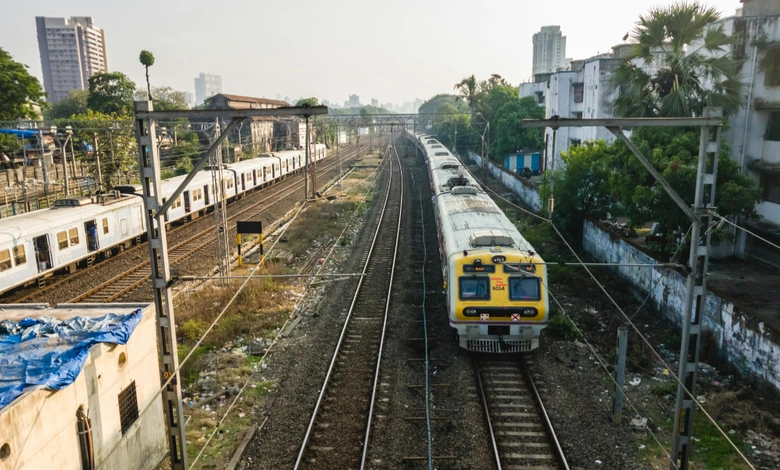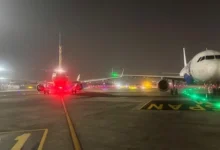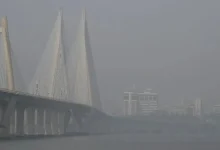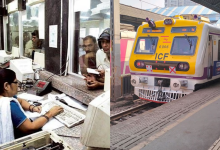Mumbai Western Railway Enforces Night Blocks for Metro Line 9 Construction as Project Reaches Completion
Key Infrastructure Work Between Mira Road and Bhayandar Stations

Mumbai’s suburban train network will see major disruptions in the coming days as Western Railway carries out imperative infrastructure work to serve the metropolis’ growing metro network. The railway body has declared large-scale night blocks on the section between Mira Road and Bhayandar stations from June 7-10, 2025, to enable launching of girders for the new Metro Line 9.
Detailed Schedule of Service Disruptions
The work will be conducted in well-planned stages to have the least possible impact on daily commuters while making sure the metro infrastructure is installed safely.
Night of June 7-8, 2025 (Saturday/Sunday)
The longest block will be over the weekend change, which will last 1 hour and 45 minutes between 1:30 AM and 3:15 AM. This long duration will enable construction teams to carry out the most complicated part of the girder installation process.
Service Adjustments:
- Last Virar-bound train from Churchgate: 11:58 PM
- Last Bhayandar-bound train from Churchgate: 11:38 PM
- Last Churchgate-bound train from Virar: 12:05 AM
June 8-9 and 9-10 Nights, 2025 (Sunday/Monday & Monday/Tuesday)
The next two nights will witness shorter but still significant construction windows, with blocks of 1 hour and 15 minutes from 1:45 AM to 3:00 AM.
Service Adjustments Both Nights:
- Last Virar-bound train from Churchgate: 12:20 AM
- Last Churchgate-bound train from Virar: 12:05 AM
What Commuters Need to Know
As per Vineet Abhishek, Western Railway Chief Public Relations Officer, the work would mean both service adjustments and total cancellations of some suburban trains. Travellers going to and coming back in late evenings and early mornings should make other arrangements for travelling within the mentioned block timings.
The railway officials have tactfully planned these operations during off-peak hours of passenger traffic to reduce inconvenience. Shift workers, night shift staff, and commuters who have early morning travel plans should however observe the new timings.
Metro Line 9: The Transport Game-Changer for Mumbai
The building activity behind these short-term disruptions is a mere part of a much greater change in the public transport reality of Mumbai. The Metro Line 9 or Red Line is an extension of the city’s metro lines and is going to change the way the northern suburbs are connected.
Recent Milestone Achievement
The project achieved a significant milestone recently when Maharashtra Chief Minister Devendra Fadnavis, Deputy Chief Ministers Ajit Pawar and Eknath Shinde, flagged off trial runs for Phase 1 of the corridor officially. The ceremony signified the start of the last testing phase before commercial operations are initiated.
The leadership group also organized a detailed technical inspection of the route, reflecting the commitment of the state government to applying the utmost safety and operational standards to the new metro line.
Project Scope and Timeline
Metro Line 9 will bring a crucial link between Mira-Bhayandar and Dahisar (East) as an extension of the hugely successful Metro-7 line connecting Dahisar East to Andheri East. The initial phase from Dahisar (East) to Kashigaon is slated for inauguration by the end of 2025.
This phase-by-phase implementation enables authorities to start serving passengers on completed sections while work proceeds on the remaining segments of the line.
Revolutionizing Mumbai’s Connectivity
Anticipated Gains
The new metro railway line is planned to resolve some of Mumbai’s most contentious transportation issues:
Increased East-West Connectivity: The corridor will offer highly sought-after rapid transit links between the eastern and western sections of the northern suburbs, regions that have long lacked direct public transport links.
Shorter Travel Times: Travelers between Dahisar, Mira Road, and Bhayandar will have significantly reduced journey times compared to existing road-based options.
Decongestion of Traffic: By offering a safe metro alternative, the line should take some load off already clogged roads in northern Mumbai and the Mira-Bhayandar area.
Integration into Operations
In its first phase of operations, Metro Line 9 trains will efficiently use the already existing Charkop depot for maintenance and servicing. The facility already handles Metro-7 operations, highlighting the integrated model applied to Mumbai metro development.
This common infrastructure model not only decreases operating expenses but also maintains uniform service standards across various metro lines.
Looking Ahead
The existing night blocks, although temporarily disruptive, are the last important steps toward realizing this revolutionary infrastructure project. When operational, Metro Line 9 will be part of Mumbai’s increasing number of metro lines, helping the city achieve its dream of becoming an organicly connected metropolis.
For the daily commuter, short-term disruption guarantees long-term dividends in terms of enhanced connectivity, decreased transit time, and environmentally friendly means of transport. The project is a testament to Mumbai’s efforts to modernize its transportation infrastructure while preserving the efficiency of its current suburban railway system.
As the city advances and develops further, such schemes as Metro Line 9 will become even more vital in terms of making Mumbai’s transport network capable of catering to its millions of inhabitants and tourists. Mumbai Commuters Warning: Western Railway Deploys Night Blocks for Metro Line 9 Work as Scheme Approaches Completion
Major Infrastructure Work Between Bhayandar and Mira Road Stations
Mumbai suburban railway services will face major disruptions in the coming days as Western Railway carries out important infrastructure work to aid the city’s growing metro system. Major night blocks on trains between Mira Road and Bhayandar stations from June 7-10, 2025, have been declared by the railway authority to allow launching of girders for the new Metro Line 9.
Detailed Schedule of Service Disruptions
The construction activity shall be executed in a well-prepared sequence of phases to reduce disturbance to regular commuters and ensure the safe fitting of metro infrastructure.
Night of June 7-8, 2025 (Saturday/Sunday)
The longest block will be during the weekend shift change, for 1 hour and 45 minutes between 1:30 AM and 3:15 AM. This longer window of time will enable construction teams to finish the most complicated parts of the girder installation procedure.
Service Adjustments:
- Last Virar-bound train from Churchgate: 11:58 PM
- Last Bhayandar-bound train from Churchgate: 11:38 PM
- Last Churchgate-bound train from Virar: 12:05 AM
June 8-9 and 9-10 nights, 2025 (Sunday/Monday & Monday/Tuesday)
These two nights will have shorter but similarly significant construction windows, with blocks of 1 hour and 15 minutes between 1:45 AM and 3:00 AM.
Service Adjustments for Both Nights:
- Last Virar-bound train from Churchgate: 12:20 AM
- Last Churchgate-bound train from Virar: 12:05 AM
What Commuters Should Know
As per Vineet Abhishek, Western Railway Chief Public Relations Officer, construction will lead to service adjustments as well as total cancellations of some suburban trains. Commuters traveling late at night and early in the morning should make alternative travel arrangements during the respective block hours.
These operations have been strategically planned by the railway authorities at the lowest traffic hours of the day in order to reduce inconvenience. Still, night-shift workers, early morning traveling people, and shift workers need to pay attention to these new schedules.
Metro Line 9: A Game-Changer for Mumbai’s Transport Network
The work on construction that is responsible for these temporary interruptions is merely a part of a much bigger change in Mumbai’s public transport infrastructure. Metro Line 9, or the Red Line, is a major expansion of the city’s metro system and will revolutionize connectivity in the city’s northern suburbs.
Recent Milestone Achievement
The project achieved a significant milestone last month when Maharashtra Chief Minister Devendra Fadnavis, Deputy Chief Ministers Ajit Pawar and Eknath Shinde, flagged off trial runs for Phase 1 of the corridor. The event initiated the final testing phase prior to the start of commercial operations.
The leadership team also performed a thorough technical evaluation of the route, showing the commitment of the state government to ensuring the highest operational and safety standards for the new metro line.
Project Scope and Timeline
Metro Line 9 will create a crucial link between Dahisar (East) and Mira-Bhayandar, which would be an extension of the already booming Metro-7 line from Dahisar East to Andheri East. The initial phase from Dahisar (East) to Kashigaon is gearing up for inauguration by the end of the year 2025.
This stage-by-stage strategy enables authorities to start serving commuters along sections that are completed while the remaining part of the line is under construction.
Changing Mumbai’s Connectivity
Anticipated Gains
The new metro line is intended to resolve many key transportation issues surrounding Mumbai:
Increased East-West Linkage: The corridor will offer badly needed high-speed transit linking the eastern and western sections of the northern suburbs, regions traditionally under-served by direct public transport routes.
Shorter Travel Distances: Travelers between Dahisar, Mira Road, and Bhayandar will have much reduced travel times compared to existing road-based options.
Traffic Decongestion: By offering a dependable metro alternative, the line is likely to ease the pressure on already clogged roads in northern Mumbai and the Mira-Bhayandar area.
Operational Integration
In its initial operating years, Metro Line 9 trains will make use of the existing Charkop depot for maintenance and servicing. This facility currently serves Metro-7 operations, reflecting the integrated strategy to Mumbai’s metro network development.
This common infrastructure approach not only lowers operational expenses but also provides uniform service standards for various metro lines.
Looking Ahead
The existing night blocks, though short-term inconvenient, are the last essential steps towards realizing this transformative infrastructure project. With completion, Metro Line 9 will become one of Mumbai’s expanding number of metro lines, helping realize the city’s vision of being a proper connected metropolis.
For the regular commuters, the temporary inconvenience guarantees long-term gains in the way of increased connectivity, shorter commutes, and greener modes of transportation. The project represents Mumbai’s bid to bring its transport infrastructure up to date while retaining the efficiency of its current suburban railway system.
As the city expands and develops, initiatives such as the construction of Metro Line 9 will become even more crucial in ensuring that Mumbai’s transportation infrastructure has the capacity to serve its millions of people and tourists.




